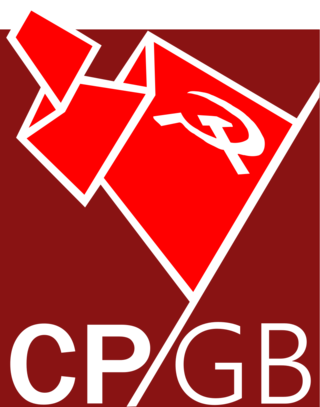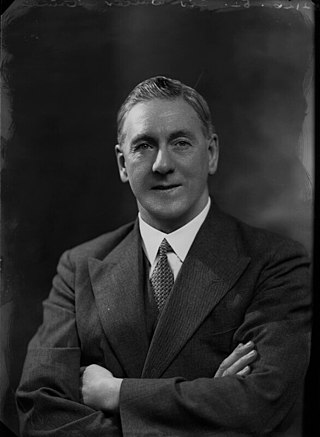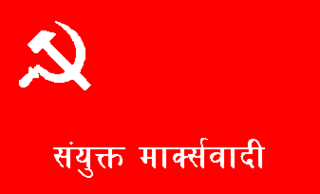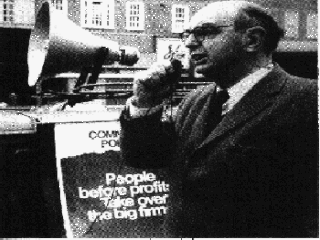
Robert Crow was an English trade union leader who served as the General Secretary of the National Union of Rail, Maritime and Transport Workers (RMT) from 2002 until his death in 2014. He was also a member of the General Council of the Trades Union Congress (TUC). A self-described "communist/socialist", he was a leading figure in the No to EU – Yes to Democracy campaign.

The Communist Party of Great Britain is a political group which publishes the Weekly Worker newspaper. The CPGB (PCC) claims to have "an internationalist duty to uphold the principle, 'One state, one party'. To the extent that the European Union becomes a state then that necessitates EU-wide trade unions and a Communist Party of the EU". In addition, it is in favour of the unification of the entire working class under a new Communist International. It is not to be confused with the former Communist Party of Great Britain, the Communist Party of Great Britain (Marxist–Leninist), or the current Communist Party of Britain.

The Communist Party of India (CPI) is the oldest communist party in India. The CPI was founded in modern-day Kanpur on 26 December 1925. Currently it has 2 members in Lok Sabha and 2 members in Rajya Sabha. It has the current ECI status of a state party.

The New Communist Party of Britain is an anti-revisionist Marxist–Leninist communist party in Britain. The origins of the NCP lie in the Communist Party of Great Britain from which it split in 1977. The organisation takes an anti-revisionist stance on Marxist–Leninism and is opposed to Eurocommunism. After the fall of the Soviet Union the party was one of two original British signatories to the Pyongyang Declaration in 1992. It publishes a newspaper named The New Worker.
The Weekly Worker is a newspaper published by the Communist Party of Great Britain (CPGB-PCC). The paper is known on the left for its polemical articles, and for its close attention to Marxist theory and the politics of other Marxist groups. It claims a weekly online readership averaging over 20,000, Weekly Worker simultaneously also distributes 500 physical copies a week.

Earl Russell Browder was an American politician, spy for the Soviet Union, communist activist and leader of the Communist Party USA (CPUSA). Browder was the General Secretary of the CPUSA during the 1930s and first half of the 1940s.

Walter McLennan Citrine, 1st Baron Citrine, was one of the leading British and international trade unionists of the twentieth century and a notable public figure. Yet, apart from his renowned guide to the conduct of meetings, ABC of Chairmanship, he has been little spoken of in the history of the labour movement. More recently, labour historians have begun to re-assess Citrine's role.

The Communist Party of Nepal (United Marxist) was a political party in Nepal existing from 2005 until 2013.

Kannoth Muraleedharan is an Indian National Congress (INC) politician from Kerala, the son of eminent congress leader K. Karunakaran. He was elected as member of the Lok Sabha thrice from the Kozhikode constituency, subsequently leaving the party in 2005. For a while he had joined NCP of Sharad Pawar. Then he rejoined Congress. He was elected as the Chairman of KPCC Campaign committee in September 2018. He entered 17th Lok Sabha by winning from the Vatakara in 2019 general elections.
The Workers and Peasants Party (WPP) (also known as the Kirti Kisan Party) was a political party in India, which worked inside the Indian National Congress in 1925–1929. It became an important front organisation for the Communist Party of India and an influential force in the Bombay labour movement. The party was able to muster some success in making alliances with other left elements inside the Congress Party, amongst them Jawaharlal Nehru. However, as the Communist International entered its 'Third Period' phase, the communists deserted the WPP project. The WPP was wound up, as its leadership was arrested by the British authorities in March 1929.

The Nepal Communist Party, abbreviated NCP is a defunct communist party which existed in Nepal from 2018 to 2021. It was founded on 17 May 2018, from the unification of two leftist parties, Communist Party of Nepal and Communist Party of Nepal. The unification was completed by the Party Unification Coordination Committee, after eight months of negotiation. The two predecessor parties subsequently dissolved, making way for the new united party. The party retained the electoral symbol of the CPN (UML), the sun.

David James Shearer is a New Zealand United Nations worker and politician. He was a member of the New Zealand Parliament for the Labour Party from 2009 to 2016, serving as Leader of the Opposition from 2011 to 2013.

John Ross Campbell was a British communist activist and newspaper editor. Campbell was a co-founder of the Communist Party of Great Britain and briefly served as its second leader from July 1928 to July 1929. He is best remembered as the principal in the Campbell Case. In 1924, Campbell was charged under the Incitement to Mutiny Act for an article published in the paper Workers' Weekly. Campbell called on British soldiers to "let it be known that, neither in the class war nor in a military war, will you turn your guns on your fellow workers, but instead will line up with your fellow workers in an attack upon the exploiters and capitalists." He was sentenced to six months in prison.

Sid French (1920–1979) was a British communist activist and organiser, former Surrey district secretary of the Communist Party of Great Britain (CPGB) and the founding general secretary of the New Communist Party of Britain.
Secretary is a title often used in organizations to indicate a person having a certain amount of authority, power, or importance in the organization. Secretaries announce important events and communicate to the organization. The term is derived from the Latin word secernere, "to distinguish" or "to set apart", the passive participle meaning "having been set apart", with the eventual connotation of something private or confidential, as with the English word secret. A secretarius was a person, therefore, overseeing business confidentially, usually for a powerful individual.
The Revolutionary Communist Party of Britain (Marxist–Leninist) (RCPB-ML) is a small British communist political party, previously named the Communist Party of England (Marxist-Leninist) on formation in 1972 until being reorganised in 1979 after rejecting Maoism and aligning with Albania. The party's thinking is based on the politics of Hardial Bains, who travelled the world founding orthodox (anti-revisionist) communist parties.

The Communist Party of Great Britain (CPGB) was the largest communist organisation in Britain and was founded in 1920 through a merger of several smaller Marxist groups. Many miners joined the CPGB in the 1926 general strike. In 1930, the CPGB founded the Daily Worker. In 1936, members of the party were present at the Battle of Cable Street, helping organise resistance against the British Union of Fascists. In the Spanish Civil War the CPGB worked with the USSR to create the British Battalion of the International Brigades, which party activist Bill Alexander commanded.
The Workers Revolutionary Party is a Trotskyist group in Britain once led by Gerry Healy. In the mid-1980s, it split into several smaller groups, one of which retains possession of the name.
Proletarian was a journal produced by a small far-left organisation active in the United Kingdom in the 1980s, which is generally also referred to as Proletarian. The organisation was known for its extreme pro-Soviet stance.

Communism in Nepal traces its roots back to the pro-democracy movement of 1951, and the subsequent overthrow of the autocratic Rana regime and the establishment of democracy in Nepal. The communist movement in Nepal has split into factions multiple times and multiple factions have come together into a single fold at times as well. It has a history of getting banned from open political discourse, as well as multiple instances of embracing guerrilla insurgency, most notably, the Maoist insurgency in the 1990s and early 2000s that led to the Nepalese Civil War, claiming at least 17,000 lives.














